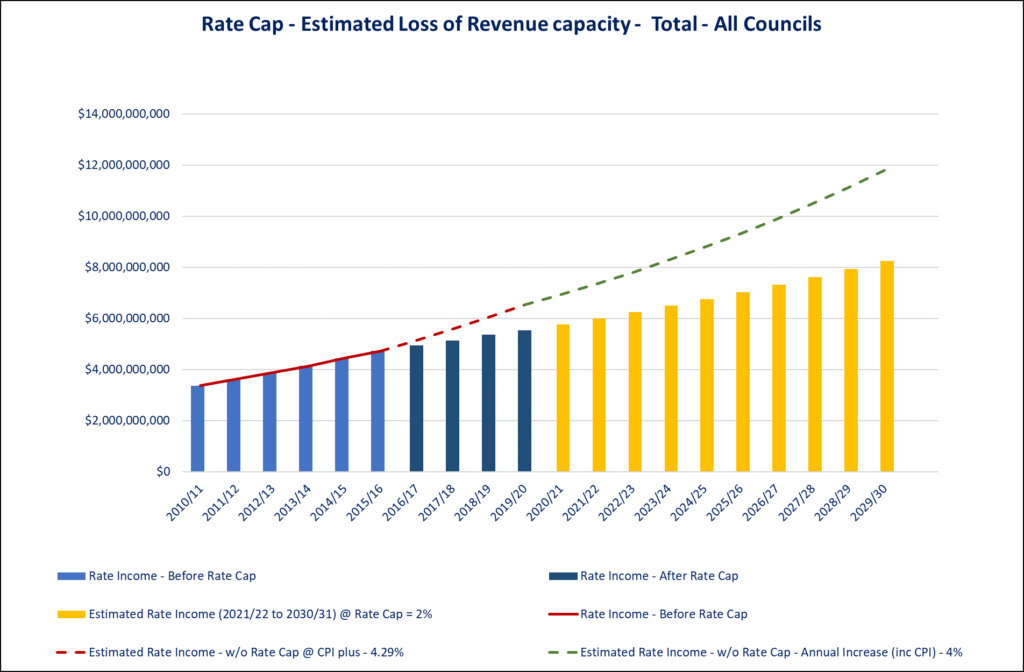Look at what is coming up in financial services in Victorian Local Government in the coming months:
- 10-year long term financial plans supported by 10-year Asset Management Plans
- Development of service performance principles
- 4-year Revenue and Rating Plan
- 4-year Annual Budgets
- New Annual Report and Performance Statement provisions
Also new community vision and Council Plan with new Councillors will compound this workload!
This transition to the Local Government Act 2020 is also happening at a time of reduced revenue raising capacity due to the compounding impact of rate capping.
The CT Management Group AMCap program is showing Council has a growing renewal gap.
Victorian Councils have lost $2.33 billion of revenue raising capacity, in the last 4 years, due to rate capping. This revenue capacity loss will increase to an estimated $21.14 billion over the next 10 years to 2029/30! That is the equivalent of the sectors previous 10-year capital works program delivery.
This loss of revenue raising capacity points to the need for Councils to more rigorously control and manage expenditure – investment in services, levels of service and capital investment! Council needs a robust financial planning framework to manage this complexity and engage its community.
Many Councils have recently adopted Community Engagement principles and policies that will need to be adhered to as these financial transition issues are adopted. So not only is the fiscal environment difficult, compounded by COVID-19, the statutory environment is demanding a longer term perspective, supported by deliberative community engagement.
The CT Management Group approach to financial planning is unique – a financial plan based on service performance principles (demand, priority and profile), along with prioritised capital investment.
Our approach enables meaningful community engagement with the capability to model comprehensive comparative choice scenarios. The CT Management Group also has detailed information on Council’s rates and charges and the capability to deliver four-year Rating and Revenue Strategies. We can provide the above analysis Council-by-Council with a detailed profile of assessment and valuation changes over the preceding 10 years.

One of the keys to managing expenditure in a strategic and collaborative way is through Service Planning where we assist Council implement their service performance principles and increase understanding of the sustainability of the current service delivery model.
Service Planning aims to focus Council on defining deliverable and measurable service outputs and outcomes to their community. Service Plans define programs that need to be undertaken to deliver the service, and include specific information on service levels, cost, and future demand. Service planning applies to all services with an emphasis on achieving desired service outcomes within a financially sustainable framework.
Service Plans describe the current level of service and the costs and benefits to provide that service for the period of the Long-Term Financial Plan (10 years).
The Service Plan is a tool to engage the community about the service levels and standards Council can afford to provide, as well as respond to the cost of increasing levels of service should the community request this.
The initial stage in the preparation of a Service Plan is to determine the service outcomes, the benefits and the current levels of service in some detail. The cost of providing the service is then estimated for the forward 10 years, based on projected demand. Once all the forward services and their costs have been entered into the Long-Term Financial Plan together with proposed capital expenditure, Council is in a position to understand whether the current service offering is financially sustainable.
If funding adjustments need to be made then the Council can use the Service Plans to understand the true impacts of funding adjustments, through lowering levels of service, relinquishing services or increasing rates and charges to meet the costs of community demand.
Using CT Management’s Service Planning Framework Council can make comparative choice decisions in a much more transparent manner. This places Council in a much better position to report accurately on its performance to the community.
Having detailed Service Plans with costed levels of service allows comparative choice decisions to be made in a transparent manner when annual budget adjustments are required.
Service Planning has the following benefits:
- Defines achievable service deliverables from Council
- Provides a framework to measure and monitor performance
- Creates better understanding of the life-cycle cost of the service
- Feeds accurate service information into the long-term financial plan
- Ensures fully informed comparative choice decisions
- Quantifies the true impact of future adjustments to service levels and funding
- Improves transparency of decision making
Should your Council wish to explore this or any financial service of the CT Management Group please contact our Financial Services Manager, Sonia Giofches on P: 1300 500 932 or submit a request via our contact form below.
If you have a need for temporary financial management assistance please contact our National Placements Manager, Malcolm McKenzie on P: 1300 500 932 or submit a request via our contact form below:
The CT Management Group look forward to assisting Council through this transition.